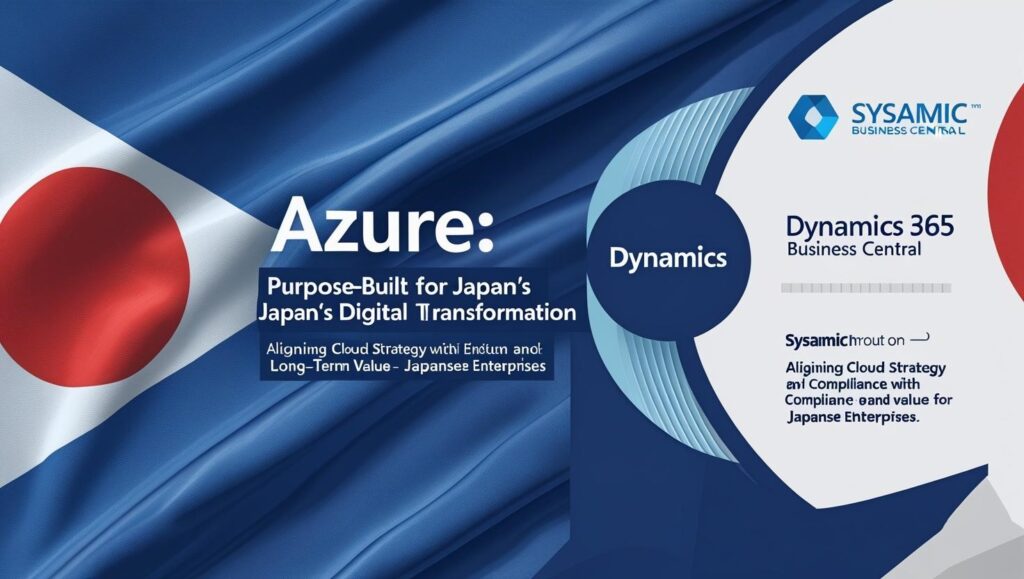
Introduction
Japan’s business ecosystem is undergoing a pivotal デジタルトランスフォーメーション (Digital Transformation – DX). This shift is not just about adopting new technologies, but about reinventing business models in a competitive, compliance-heavy, and customer-centric environment. Cloud computing has become the foundation of DX—and enterprises in Japan are now faced with a strategic question:
Which hyperscale cloud best aligns with their business priorities—Microsoft Azure or AWS (Amazon Web Services)?
At Sysamic, we help Japanese businesses navigate this choice through the lens of Microsoft Dynamics 365 Business Central, local compliance, and the long-term value of a well-integrated IT landscape.
Understanding the Japanese Cloud Landscape
Japan’s regulatory environment, data sovereignty expectations, and operational preferences make global cloud strategies non-transferable. Enterprises require:
Japanese language support
Local data residency (to comply with 金融庁 – Financial Services Agency regulations)
Seamless integration with Microsoft ecosystems
Scalability, governance, and cost predictability
While both Microsoft Azure and AWS operate data centers in Japan, they differ greatly in their alignment with enterprise productivity, compliance, and ERP integration needs.
Microsoft Azure in Japan
Microsoft Azure offers a hyper-integrated enterprise platform, especially beneficial for companies leveraging Microsoft’s business stack. For Japanese enterprises, Azure provides:
Regional data centers in Tokyo and Osaka, ensuring local compliance and high availability
Seamless integration with Microsoft 365, Power BI (Business Intelligence), Power Automate, and Dynamics 365 Business Central
Native support for Japanese localization and regulatory requirements
Hybrid cloud flexibility—a common requirement for companies that want gradual migration
Sysamic leverages Azure to architect secure, optimized cloud environments that are natively tied to Microsoft Dynamics 365, ensuring that cloud infrastructure supports—not disrupts—your core operations.
AWS in Japan
While AWS also offers data centers in Japan and a wide array of services, its lack of native integration with Microsoft enterprise applications often introduces:
Higher configuration complexity when connecting to Business Central or Microsoft 365
Disparate interfaces and billing mechanisms
Limited governance over unified application environments
For organizations using Dynamics 365 Business Central as their ERP (Enterprise Resource Planning) system, the additional overhead of customizing AWS to behave like a Microsoft-native environment often offsets any infrastructure-level advantages.
Microsoft Azure with Business Central
At Sysamic, our cloud strategy is built on deep alignment between infrastructure and business applications. We specialize in deploying Microsoft Dynamics 365 Business Central on Azure, enabling clients to:
Unify finance, sales, inventory, and operations in one secure cloud platform
Gain real-time business insights through native integration with Power BI
Build workflows using Power Automate to streamline repetitive processes
Scale globally while maintaining compliance with Japanese data regulations
Our role is not just technical deployment, but architecting sustainable, scalable systems that support growth, digital transformation, and Japan-specific compliance.
Security, Compliance & Data Residency: Why Azure Aligns with Japanese Needs
Japanese industries—especially those in manufacturing, distribution, and finance—operate under strict 情報セキュリティ (Information Security) mandates. Azure offers:
ISO/IEC 27001, SOC (System and Organization Controls) 1/2/3, and Japan-specific compliance certifications
Role-Based Access Control (RBAC) and Azure Active Directory (AD) for secure identity management
Data residency assurances with backups and failover within Japan
Sysamic ensures that cloud security architectures are custom-built, combining Azure’s features with customer-specific compliance workflows and audit trails.
Total Cost of Ownership and Integration
While infrastructure pricing is often cited in favor of AWS, Azure delivers greater long-term ROI (Return on Investment) for businesses using Microsoft systems. Consider:
Lower integration costs with Business Central
Unified billing models through Microsoft CSP (Cloud Solution Provider) programs
Licensing synergies—especially with Microsoft 365 and Dynamics 365 bundles
Reduced need for third-party connectors or middleware
Sysamic works closely with Japanese CFOs and CIOs to ensure TCO (Total Cost of Ownership) is optimized not just at the infrastructure layer, but across the full digital estate.
Why Japanese Enterprises Choose Sysamic and Azure
At Sysamic, we combine technical precision with cultural understanding of the Japanese market. These are the reasons why our clients choose us:
日本語対応 (Japanese language support) at every phase of implementation
Expertise in Microsoft Dynamics 365 Business Central deployment on Azure
Proven track record in regulatory compliance, including 電子帳簿保存法 (Japan’s e-Document Preservation Law)
A partnership-first mindset—透明性 (transparency), 成長 (growth), and 信頼性 (trust)
Our Azure deployments are not “lift-and-shift.” They are strategically designed to unlock long-term value across the enterprise, with ongoing optimization and local support.
Conclusion
For Japanese enterprises embracing digital transformation, the cloud is no longer optional—it’s foundational. And while both Azure and AWS offer scalable cloud platforms, only Azure delivers the end-to-end, enterprise-ready ecosystem that aligns with Japanese business structures, Microsoft’s ERP systems, and regional compliance needs.
With Sysamic as your trusted Microsoft Dynamics 365 Partner in Japan, you gain not just cloud infrastructure, but a holistic digital strategy grounded in real business value.
To learn how Sysamic can support your digital transformation in Japan, email us at info@sysamic.com or fill out our contact form here to get in touch.
